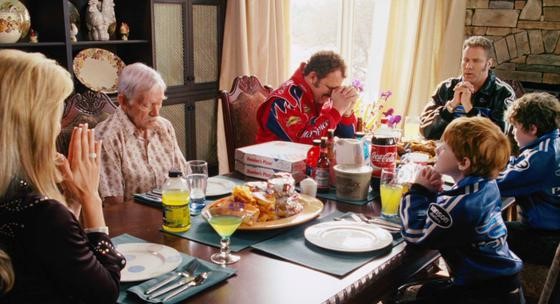
Throughout Lent, we’re exploring the parables of Jesus – the two dozen or so stories that were his chief means of describing the reality of God’s rule on earth.
Very few Hollywood films feature a family praying together before dinner.
After listening in on the table grace in Talladega Nights: The Legend of Ricky Bobby, that might be just as well.
NASCAR driver Ricky Bobby, played by Will Farrell, folds his hands and prays: “Dear Lord Baby Jesus, I want to thank you for this wonderful meal, my two beautiful sons, Walker and Texas Ranger, and my Red-Hot Smokin’ wife, Carley.”
Ricky goes on: “Dear eight pound, six ounce baby infant Jesus…lying there in your little manger, lookin’ at your Baby Einstein developmental videos, learnin’ ‘bout shapes and colors…”
Carley cuts in: “Hey, um, Sweetie…Jesus did grow up. You don’t always have to call him a baby.” Ricky responds: “Look, I like the Christmas Jesus best, and I’m sayin’ grace. When you say grace, you can say it to the Grownup Jesus or Teenage Jesus or Bearded Jesus or whoever you want.”
What follows is a bit of a theological free-for-all. Everybody in the family votes for a favorite Jesus.
“I like to think of Jesus like a Ninja, fightin’ off evil samurai,” says one of the boys. “I like to think of Jesus like a muscular trapeze artist,” says the other. Ricky’s race partner adds: “I like to picture Jesus in a tuxedo T-shirt. ‘Cause it says like, I wanna be formal but I’m here to party, too. I like to party, so I like my Jesus to party.”
As a general rule it’s wise not to go to Ricky Bobby for theology. But Ricky’s family is willing to do openly what most Americans do more discretely: We choose our own Jesus.
Someone will say, “I love the forgiving Jesus – the one who rescued the woman caught in adultery.” Someone else will say, “I love the Jesus who holds people accountable – the one who immediately told that same woman to go and sin no more.”
Jesus is wonderfully, strangely, even maddeningly hard to pin down. There’s something in the Gospel stories about Jesus to please everybody. And something to offend everybody.
Does Jesus stand for Maximum Grace or Maximum Justice? Yes.
New York Times columnist Ross Douthat, author of Bad Religion: How We Became a Nation of Heretics, captures the paradoxes: “He’s an apocalyptic prophet one moment, a wise ethicist the next… He consorts with prostitutes while denouncing even lustful thoughts. He can be egalitarian and hierarchical, gentle and impatient, extraordinarily charitable and extraordinarily judgmental. He sets impossible standards and then forgives the worst of sinners. He blesses the peacemakers and then promises that he’s brought not peace but the sword. He’s superhuman one moment; the next he’s weeping.”
Douthat concludes that this is a good thing. It’s hard to choose your own Jesus when that very choice automatically cuts you off from another entirely valid Jesus.
These paradoxes are thrown into sharp relief when we consider his parables.
How can we not be moved by the stories of the Lost Coin, Lost Sheep, and Lost Child in Luke 15? That’s who we want God to be – the Father who runs to meet us whenever we turn toward home, who forgives our sins on the spot and announces a celebratory feast. That’s who we need God to be.
But then we turn to the parable in Matthew 22:1-14, where we encounter another celebratory feast. A king has prepared a wedding banquet for his son. Everyone is invited. The festivities are underway.
“But when the king came in to see the guests, he noticed a man there who was not wearing wedding clothes. He asked, ‘How did you get in here without wedding clothes, friend?’ The man was speechless. Then the king told the attendants, ‘Tie him hand and foot, and throw him outside, into the darkness, where there will be weeping and gashing of teeth.’” (22:11-13)
What’s going on here?
Having received grace – we’re all invited to the banquet – we must not disrespect the Host. We dare not act in a cavalier, who-really-gives-a-rip fashion. Banquet guests in Bible times were expected to wear their “Sunday best.” In a culture that placed extraordinary emphasis on honor and respect, it would be unthinkable to saunter in wearing an old sweatshirt and orange flip-flops.
Jesus is warning us: Yes, grace is served at God’s banquet 24/7. But that doesn’t mean we should ever live in such a way that we take grace for granted.
The parables in the Gospels don’t present unresolvable contradictions. There’s simply a lot more to the Son of God than at first meets the eye.
We will always be tempted to choose our own Jesus, the way certain video games encourage players to “choose their own adventure.”
But generations of disciples have come to appreciate a far deeper wisdom:
We need all of Jesus to be truly saved by Jesus.
